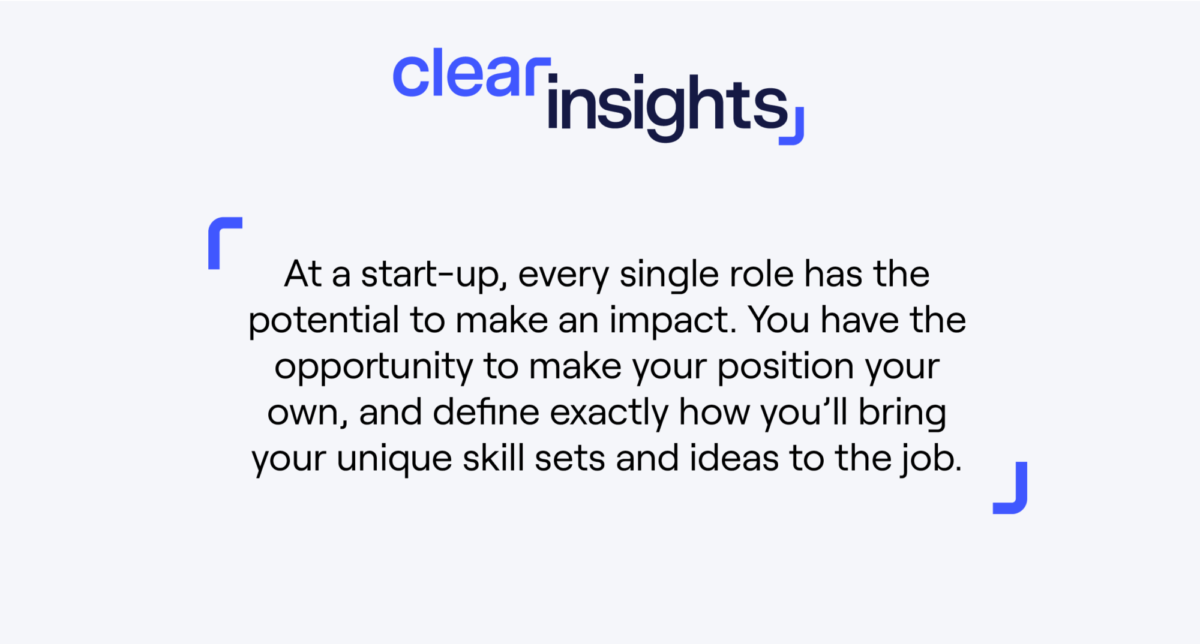Thought Leadership
Jan 30, 2023
ClearEstate Cares grant awarded to 3 remarkable non-profits in California
The ClearEstate Cares initiative is our ethos put into action. These are the three recipients of our ClearEstate Cares grants.


Perhaps you’re fresh out of university, or perhaps you’ve already begun your climb on the career ladder and are ready for something new. Whatever the case, you’ve probably come across a few career opportunities advertised at start-ups, including ours.
This isn’t the year 2004 anymore, and if you haven’t worked at a start-up yet then the chances are very high that one of your friends or colleagues has. Sometimes it can feel like start-ups are everywhere now, and while this is good news for innovation and momentum in a wide variety of fields, there are certain myths and stereotypes that surround the work culture at start-ups.
We’re here to dispel the stories and instead tell you what it’s really like to work at a start-up. ClearEstate was founded in 2020, and while we may be young, we’ve come a long way from our early days and learned a lot along the way. Crucially, we couldn’t have made it to where we are today if it weren’t for all the talented and smart people who’ve joined our team and brought along their savviness, energy, expertise, and enthusiasm to help us grow. A start-up starts with an idea, but it reaches its potential because of the people who believe in it.
If being a part of something new and transformative sounds appealing to you, then here’s what you should know about starting a career at a start-up:
At a traditional company, hierarchies are pretty fixed and your role within the company is clearly defined, without much wiggle-room. You know that saying about being a cog in a machine? While that may quite accurately describe a position at an established company that has a fixed way of doing business that they’ve been doing for the past 100 years, it definitely does not apply to a start-up.
At a start-up, every single role has the potential to make an impact. You have the opportunity to make your position your own, and define exactly how you’ll bring your unique skill sets and ideas to the job. Every person is unique, which is why we believe that there’s no “one size fits all” role. At a start-up, every person has the opportunity to break down barriers and toss out the old way of doing things in favor of something bolder and fresher. So while resumes are important, start-ups don’t care as much about where you went to university. They want to know who you are, and how you’ll bring what makes you uniquely “you” to the company. There’s no micromanaging and constant supervision at a start-up: Instead, there’s trust in your abilities and the independence to let you fly.
And because decisions are made so much quicker and more horizontally as opposed to a traditional, top-down way of governance, every employee has the opportunity to have their voices heard and bring their ideas to the table.
You’ve probably heard the stereotype that start-ups pay their employees in kombucha on tap and unlimited foosball table access. While all of those things are definitely welcome perks, start-ups value their teams and pay competitive salaries while offering incentives and benefits to ensure that their employees feel seen and appreciated.
But there’s more to having a positive work culture than just perks and compensation. At a start-up, everyone knows exactly what they’re working towards. The goals and values of the company are precise, clear, and communicated in a transparent manner. Everyone’s in this together, and everyone’s working for a common purpose while also having fun doing it. And because start-ups value proactivity and teamwork, there are always plenty of opportunities to bring new ideas to the table and challenge the status quo. In fact, start-ups encourage it.
Start-ups put a lot of energy into cultivating a workforce that’s diverse, passionate, empathetic, and ambitious. Whether that’s ensuring that teams are able to bond both in and outside of the office or making employee wellness a priority, there’s always an emphasis on creating a fun, inspiring, and supportive work culture so that everyone can be their best selves.
One of the main criticisms lobbied against start-ups is that they’re disorganized and chaotic. While we don’t share that sentiment, it is true that the working environment at a start-up can be more fast-paced than at traditional companies.
That’s because start-ups are still growing and giving their all to ensure that their idea can reach as many people as possible. Because of this, roles can often change, grow, and adapt to meet the ever-evolving demands of a growing company. If you’re someone whose eyes start to glaze over at the thought of a monotonous 9-5, this is great news: Every day brings a new adventure, and you have the unique chance of shaping your role and growing with it in a way that would be impossible at a traditional company.
Of course, this does require quick adaptability, the ability to work under pressure when required, and the willingness to wear many hats. For some, that may look like chaos. For us, it represents the chance to learn new skills and turn your ideas into reality in a way you may have never considered. And while we all work hard, we also know that the rewards are high: Your chance to make your mark, to experience true teamwork, and to work somewhere that truly understands the value of every single team member.
If that sounds like something you would like to be a part of, then visit our website or write to us directly : HR@clearestate.com
 Simplify Probate Today
Simplify Probate Today
Get expert guidance from our specialists who've helped 10,000+ families.
Book a free consultation